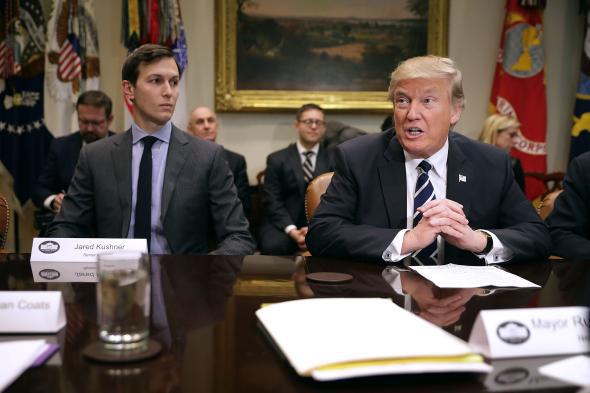Among the things we learned from the recent release of White House ethics filings is that Jared Kushner is retaining his stake in Trump Bay Street, a luxury rental high-rise building in Jersey City, New Jersey. The property represents one of the clearest overlaps of financial interests between President Trump and his son-in-law and senior adviser. The apartment complex was developed by Kushner’s family real-estate business, Kushner Companies, which pays the president’s Trump Organization for the right to slap the Trump name on it. (Trump and Kushner have plenty of other shared interests given Ivanka Trump’s stake in Trump companies.)
As has been well-covered by now, the Kushners financed the 50-story high-rise with the help of $50 million in loans obtained through a controversial government effort known as the EB-5 Immigrant Investor Program, which offers expedited two-year visas to foreign nationals who pony up at least $500,000 for qualified investments in the United States. The vast majority of such investors are Chinese; this development was no different. That fact drew plenty of deserved scrutiny—particularly given Trump’s tough talk about China during the campaign and the fact that, as president, he’ll now have a say in how the program operates moving forward. What has gotten less attention, however, is the man who made the Kushners’ EB-5 financing possible in the first place: Nicholas Mastroianni II, a Florida businessman who has also partnered with the Trump Organization on at least one other business deal.
Fortune profiled Mastroianni back in 2014, detailing what the magazine billed as the “tangled past of the hottest money-raiser in America’s visa-for-sale program.” The piece does not mention Kushner or Trump. But reading it now, the portrait the authors paint of Mastroianni seems, well, more than a little Trumpian in a very unflattering way:
A squarely built 50-year-old with a Long Island accent, Mastroianni has a long history of legal problems, failed ventures, and unpaid debts—which have continued even as his professional fortunes have turned sharply upward—leaving a legacy of conflicts, judgments, and entanglements.
A few of the lowlights that Fortune found: Mastroianni’s legal trouble began in his 20s, when he was arrested four times for felony possession of a controlled substance. (He pleaded no contest each time and received a suspended sentence and probation all four times.) In 1989, he founded a company that specialized in government-funded work soundproofing homes and businesses near airports. By 2000, however, that business had gone into receivership, and banks had foreclosed on his office properties and two homes. Two years later, he was ordered to pay out $1.1 million in a related lawsuit. In 2003, he filed for bankruptcy, during which a court-appointed trustee accused him of “knowingly and fraudulently” lying about his assets. He was also the subject of a U.S. Department of Labor lawsuit that same year accusing him of illegally withholding several hundred thousand dollars in required employer pension-fund contributions and instead using the money for his own personal and business expenses. (The government won a default judgment and Mastroianni eventually paid $75,000 in restitution as part of a negotiated partial settlement.)
Mastroianni then relocated from Rhode Island to Florida, where his business dealings didn’t get any less shady. As Fortune put it, “virtually every one of the dozen or so projects [Mastroianni’s new construction company] launched over the past decade has faced delays, lawsuits or construction problems.” Most remain unfinished. One involved a building collapse that killed two workers and seriously injured several others. (The company never faced criminal charges or regulatory fines, though they did settle a number of civil lawsuits.)
Mastroianni’s fortunes, though, began to turn around when he discovered the EB-5 program. He launched a new business called the U.S. Immigration Fund, which acts as a government-approved middleman between foreign investors seeking visas and U.S. developers. All told, the company claimed to have raised more than $1 billion in EB-5 money during its first five years. Fittingly (at least for our purposes) is that Mastroianni’s first EB-5 project was a $144-million mixed-use project in Jupiter, Florida, known as Habourside Place. The development officially opened in December 2014. The following summer, Mastroianni announced a partnership between the development and a nearby golf course. Its name? Trump National Golf Club Jupiter.
Know anything about Mastroianni or any other Trump business partner? DM Josh Voorhees on Twitter, or email him at josh.voorhees@slate.com.
